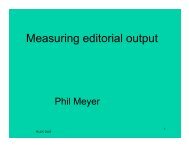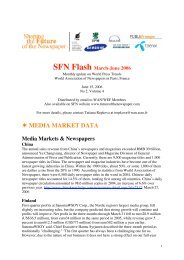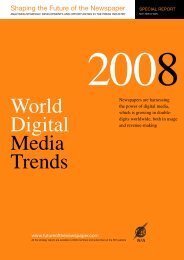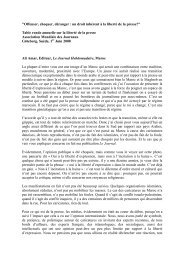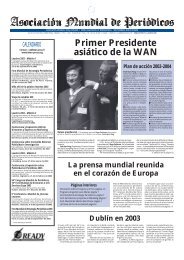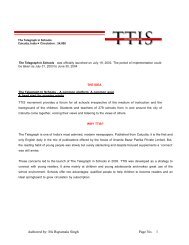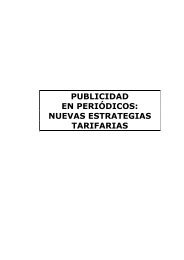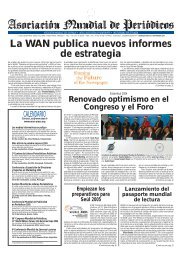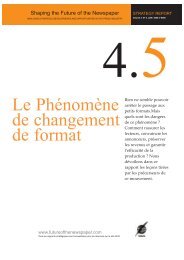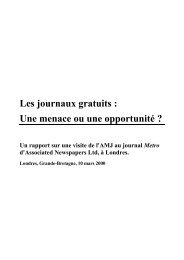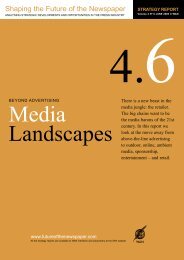WORLD PRESS TRENDS - World Association of Newspapers
WORLD PRESS TRENDS - World Association of Newspapers
WORLD PRESS TRENDS - World Association of Newspapers
You also want an ePaper? Increase the reach of your titles
YUMPU automatically turns print PDFs into web optimized ePapers that Google loves.
BRAZIL<br />
Research<br />
Circulation is audited by: Instituto Verificador de Circulação (IVC),<br />
which audits more than half the daily press.<br />
Readership is audited by: Ipsos-Marplan Pesquisas Ltda.<br />
Taxes<br />
VAT on: sales 3% advertising 3%<br />
newsprint 0 plant 0<br />
composition 5% (standard VAT rate 18%)<br />
The tax rate on pr<strong>of</strong>its is the same for all private companies<br />
(between 15% and 33%).<br />
Discounts<br />
on: post 0 rail 0 telephone 0 telegraph 0 telex 0<br />
Ownership<br />
Does any law exist governing publishing-house ownership, or the<br />
registration <strong>of</strong> shares in newspaper-publishing companies Yes, see<br />
the next question.<br />
Is there any law prohibiting or restricting foreign companies or<br />
individuals from owning shares, and in particular, the majority <strong>of</strong><br />
shares, <strong>of</strong> domestic daily newspapers Yes. Under the amended<br />
Article 222 <strong>of</strong> the Federal Constitution, legal entities may now<br />
own journalistic and radio broadcasting companies, and<br />
foreigners can own up to 30% <strong>of</strong> the voting capital in such<br />
companies.<br />
“Art. 222. Newspaper and sound and image broadcasting<br />
companies shall be owned exclusively by native Brazilians or<br />
those naturalised for more than ten years, or by legal entities<br />
that conform to Brazilian laws and have a branch in the country.<br />
§ 1º In every circumstance, at least 70% <strong>of</strong> voting capital stock<br />
<strong>of</strong> newspaper and sound and image broadcasting must belong,<br />
directly or indirectly, to native Brazilians or those naturalised<br />
for more than ten years who shall be responsible for the<br />
management and intellectual guidance there<strong>of</strong>.<br />
§ 2º Editorial responsibility and programming selection and<br />
direction are the exclusive responsibility <strong>of</strong> native Brazilians or<br />
those naturalised for more than ten years, in any kind <strong>of</strong> social<br />
communication media.<br />
§ 3º All electronic social communication media, independent <strong>of</strong><br />
the technology used, should observe the principles stated in<br />
art. 221, in the form <strong>of</strong> specific law, that also guarantee priority<br />
for Brazilian pr<strong>of</strong>essionals in the execution <strong>of</strong> domestic<br />
productions.<br />
§ 4º The participation <strong>of</strong> foreign capital in firms will conform to<br />
Brazilian law as defined in § 1º.<br />
§ 5º The national Congress shall be informed <strong>of</strong> any alterations<br />
in partnership control in firms in regard to § 1º.”<br />
Is there any law prohibiting daily newspaper or periodical publishers<br />
from operating radio or television stations in the same locality No,<br />
but monopolies are forbidden. Article 220 <strong>of</strong> the Federal<br />
Constitution states:<br />
The manifestation <strong>of</strong> thought, creation, expression and<br />
information, in any form, process or medium, shall not be subject<br />
to any restriction, with due regard to the provisions <strong>of</strong> this<br />
Constitution.<br />
· Paragraph I: No law shall contain any provision that may<br />
present a hindrance to full freedom <strong>of</strong> press information in<br />
any medium <strong>of</strong> social communication, with due regard to<br />
the provisions <strong>of</strong> Article 5, Sections IV, V, X, XIII and XIV.<br />
· Paragraph II: Any and all censorship <strong>of</strong> a political,<br />
ideological or artistic nature is forbidden.<br />
· Paragraph V: Social communications media may not,<br />
directly or indirectly, be subject to monopoly or oligopoly.<br />
· Paragraph VI: The publication <strong>of</strong> a printed social<br />
communications medium shall not be subject to licensing<br />
by authorities.<br />
So as to guarantee disclosure and transparency in the capital structure<br />
and to avert silent partnerships, is there a law or rule making it possible<br />
to determine who actually owns a publishing company Yes, see<br />
Article 222 above.<br />
Is there an antitrust law limiting concentration in the daily press<br />
Although, as mentioned above, the Federal Constitution<br />
prohibits media monopolies or oligopolies, no provisions have<br />
been made to enforce this legislation.<br />
Is further regulation <strong>of</strong> media concentration expected No<br />
<strong>WORLD</strong> ASSOCIATION OF NEWSPAPERS - <strong>WORLD</strong> <strong>PRESS</strong> <strong>TRENDS</strong> 2003 67




